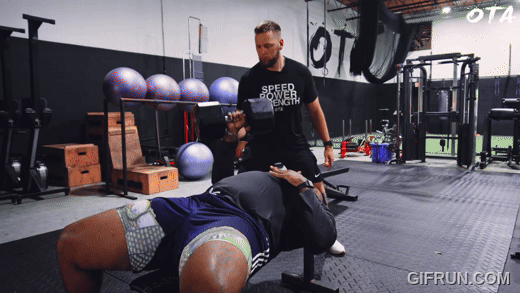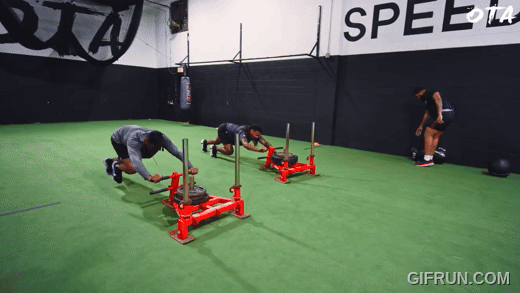The Truth About Bulking for Athletes: Building Size Without Sacrificing Speed
When athletes enter the offseason, many of them consider bulking—gaining size through increased calorie intake and strength training. However, while bulking can be a useful strategy for some athletes, it’s not always necessary, nor is it always the best approach. The truth is that bulking can sometimes do more harm than good, especially if it’s done incorrectly or too aggressively. For athletes, the goal should be to build lean muscle while maintaining or improving speed and power, not just adding weight for the sake of it. In this post, we’ll explore the nuances of bulking for athletes and how to approach it effectively, ensuring that size is gained without sacrificing performance.
Bulking Is Not Always Necessary
One of the first things athletes need to understand is that bulking isn’t always required, and it certainly isn’t necessary for every athlete. Whether or not bulking is appropriate depends on several factors: the athlete’s level (youth, high school, collegiate, or professional), the specific sport they participate in, and even the position they play. Not all athletes need to gain mass during the offseason.
For instance, a wide receiver in football or a sprinter in track may not benefit from gaining significant weight. In these sports, maintaining a lean, agile body is often more important than adding size. On the other hand, a football lineman or a powerlifter might need to bulk up to meet the demands of their position. Similarly, an athlete at different stages in their career—say, a high school player vs. a professional athlete—may have different goals when it comes to body composition.
Before deciding to bulk, athletes should carefully assess their sport and position. While some sports place a premium on size and strength, others prioritize speed, agility, and endurance. Each athlete should consider their own specific needs before jumping into a bulking phase.
The Misconception About Bulking
A common misconception is that bulking is the fastest way to increase strength and power. Many athletes believe that adding 20-25 pounds of muscle will directly translate to better performance in their sport. However, this isn’t always the case.
Chris Barnard, a performance coach, frequently encounters this myth in his work with athletes. He emphasizes that bulking should not come at the cost of speed. In fact, an athlete who gains size too quickly or excessively might find themselves sacrificing more important qualities—such as speed, agility, and overall power output—along with the extra weight.
The truth is that adding mass to your frame is not a one-size-fits-all approach. While it can improve strength, it can also have a negative impact on an athlete’s ability to perform at their best, especially if it leads to a decrease in speed and mobility. For most athletes, maintaining a balance between size and athleticism is the key to success.
Coach Chris advocates for a more mindful approach to bulking—one that doesn’t involve simply adding weight for the sake of a number on the scale, but instead focuses on building strength and muscle while preserving speed. For athletes, this means focusing on performance-based training rather than just aesthetics or size.

Controlled and Gradual Bulking
If an athlete does decide that bulking is necessary for their development, it’s essential that they take a controlled and gradual approach. The key to effective bulking is to avoid forcing weight gain at an unsustainable pace. Gaining weight too quickly can often result in undesirable outcomes, such as excessive fat gain, which can hinder performance.
A more effective approach is to focus on gradual, manageable weight gain. This involves eating a slight caloric surplus and training in a way that encourages muscle growth without adding unnecessary fat. The athlete should aim for small, consistent increases in body mass over time, allowing the body to adapt and adjust without overwhelming it.
Each athlete’s rate of weight gain should be individualized based on factors such as genetics, age, training experience, and growth phase. For example, a high school athlete going through a growth spurt may be able to handle a larger caloric surplus and gain more weight than a seasoned professional who has already reached his physical peak. It’s important to remember that forcing a rapid increase in size can lead to negative side effects, such as a decrease in speed, agility, and overall performance.
Instead, athletes should focus on building muscle at a pace their body can handle. This strategy will lead to more sustainable progress, ensuring that the athlete can maintain their performance level and avoid unnecessary weight gain that might slow them down on the field or court.
Optimal Body Weight for Performance
Every athlete has an optimal body weight at which they perform their best. This “sweet spot” is a combination of muscle mass and body fat that allows the athlete to perform at their highest level, based on their sport and position. Forcing weight gain beyond this optimal point can have detrimental effects on performance, particularly in terms of speed and power.
Athletes should listen to their bodies and work with their coaches and trainers to determine where their ideal body weight lies. For example, a sprinter may perform best at a lower body weight, while a rugby player may need to add muscle to withstand the physical demands of the game. Regardless of the sport, athletes need to respect their body’s natural limits.
If you’re a football player and you’ve been told that you need to weigh a specific amount to be successful, it’s important to remember that your optimal weight may not be the same as someone else’s. Rather than obsessing over a specific number, focus on how you feel in your training and performance. Are you faster, stronger, and more explosive at a particular weight? If not, it may be time to reassess your bulking goals.
Athletes should aim for a gradual, sustainable approach to reaching their optimal weight. Forcing weight gain can lead to inefficiency and negatively impact performance, especially in sports where speed and power are critical.

Efficient Weight Gain and Avoiding Excess Fat
One of the biggest mistakes athletes make when bulking is gaining too much fat along with muscle. This can happen when athletes consume excess calories without paying attention to the quality of those calories. Bulking should focus on gaining lean muscle mass, not just adding weight. Extra fat—especially visceral fat, which surrounds internal organs—can impair athletic performance by reducing speed, power, and efficiency.
Excess body fat also increases the risk of injury, as it can put extra strain on the joints and muscles. For athletes, maintaining a lean physique is essential for overall health and performance. Coach Chris advises athletes to avoid unnecessary fat gain by focusing on nutrient-dense foods and smart training practices. This approach helps ensure that the weight gained is primarily lean muscle mass, not fat.
The most effective way to bulk without adding unwanted fat is to prioritize high-quality protein sources, moderate healthy fats, and a balanced intake of carbohydrates. Additionally, maintaining a consistent strength training program that emphasizes compound movements (such as squats, deadlifts, and bench presses) will help build muscle without adding excess fat.
Athletes who successfully bulk by gaining lean mass rather than fat will experience improved performance, reduced injury risk, and better long-term results.
Conclusion
In conclusion, bulking is not a one-size-fits-all solution for athletes looking to improve their performance. While it may be necessary for some, particularly in sports where size is a key component, bulking is not always appropriate. It’s important for athletes to focus on their optimal body weight and approach bulking gradually, allowing their bodies to naturally adapt. Speed, power, and agility should never be sacrificed for the sake of size. Instead, athletes should prioritize lean muscle gain and efficiency, ensuring that every pound of weight gained contributes to their overall performance. By avoiding the pitfalls of forced bulking and focusing on controlled, efficient weight gain, athletes can build size without sacrificing the qualities that make them excel in their sport!

